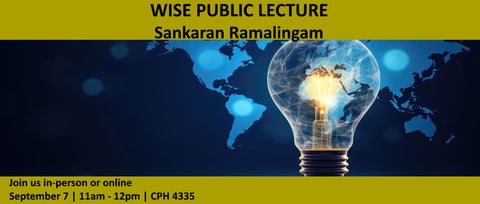Title:
Decoding Energy Access Challenges, Integrating Attainment of UNSDGs
Abstract:
Waterloo Institute of Sustainable Energy (WISE) has launched AFFORDABLE ENERGY FOR HUMANITY (AE4H), a global coalition with the laudable objective to harness global muscle and brain power to transform the lives of a third of Humanity of around 2.5 billion people who lack access to modern fuels such as electricity and gas. The unfortunate poorest in the world, cook and heat their homes using open fires and simple stoves burning biomass (wood, animal dung, crop waste, etc.) even today. Needless to say, the lack of a proper source of energy, particularly electricity, impacts all aspects of rural life. Fumes from cooking lead to health problems and premature death. Children cannot study at night. There is no storage for vaccines or other medicines. Neither there is light nor electrical devices for healthcare workers. In the wake of the above trajectory, it will make sense to explore an economic model that supports energy creation for cooking by households at the grassroots besides creating a source of additional income for the women and being sustainable from a people-profit-planet perspective. It is laudable to have a mission and clarity of purpose to deliver the fundamental physics and material design innovations that would pave the way to the next set of devices to tackle the severe setbacks to humanity as a whole. But the solutions must be engineered in the cultural context of the way people live their lives to enable adoption by them with ease and immediately, without losing time.
The presentation also portrays that when the objective of “creating low carbon footprint” kitchens is achieved, the corporates in the society who are inducted in, as benevolent promoters of the mission can think of scaling this program to all its communities under its climate change initiative. Also, if the corporation has a climate change already in place, it is possible to fold the cookstove program into its existing carbon credit Program. When the objective of - “earn as you cook” is achieved, the corporation will have the learnings of an economic model that can be scaled up and replicated in many such communities. Besides the model has demonstrated that it can bring in socio-economic benefits such as livelihood, carbon emission reduction, poverty alleviation, maternal and child health, women empowerment, etc., and fits very well with achieving five UN SDGs besides meeting with the mission of AE4H.
Bio:
Presented by Sankaran Ramalingam who is the President of ENFUSE, the Energy & Fuel User’s Association of India.
He is qualified in Electrical Mechanical and Industrial Engineering besides holding a postgraduate diploma in Management. Sankaran is the former Chairman and Managing Director of Chennai Petroleum Corporation and Indian Additives Ltd, a Joint venture with Chevron Corporation, USA. With over 40 years of experience in the Industry, Sankaran now focuses on the promotion of solar and other renewable energies, in India. He has also served the planning commission on the Power and Renewable Energy division for the 11th Plan for the State appointed by the Tamil Nadu Government in India.
